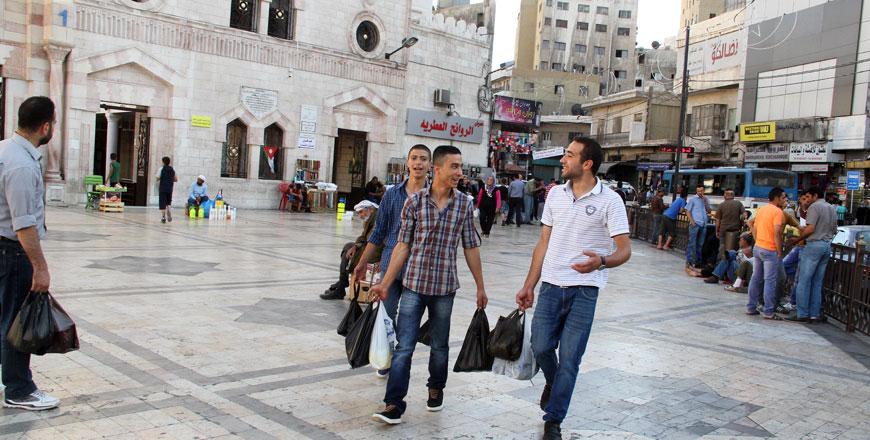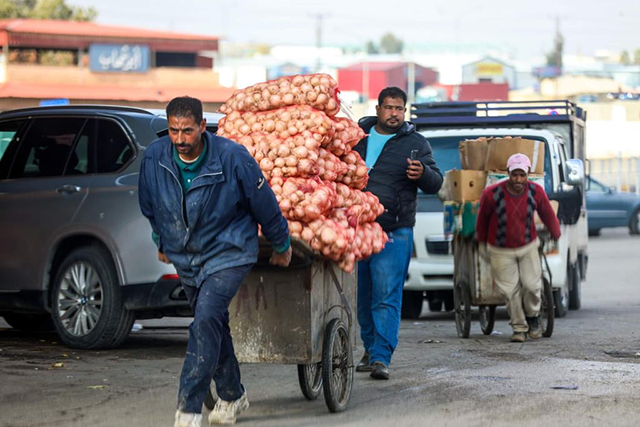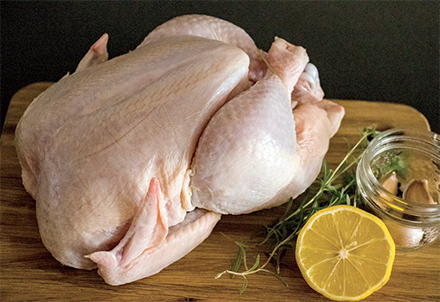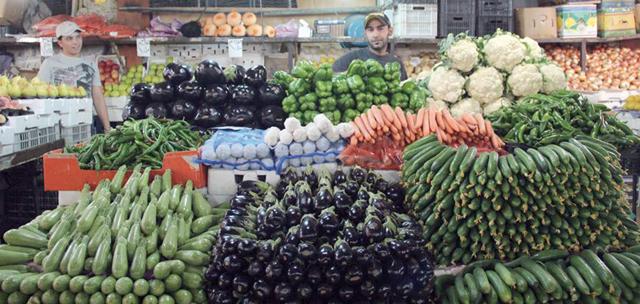You are here
Prices of food items relatively stable in first week of Ramadan — study
By Merza Noghai - Jun 28,2015 - Last updated at Jun 28,2015

Shoppers carry bags of grocery recently in downtown Amman. Consumption of food and beverages rises sharply during the fasting month of Ramadan due to a change in eating habits (Photo by Osama Aqarbeh)
AMMAN — A Ministry of Industry, Trade and Supply study covering 60 food items during the first week of Ramadan showed that the prices of 46 items (77 per cent) either remained the same or decreased, compared with the previous week.
The prices of 28 food items — constituting 47 per cent of the sample — dropped; 14 items (23 per cent) went up in price; while 18 items maintained their prices, according to a ministry statement sent to The Jordan Times.
The items that witnessed a drop in prices include oil, rice, sugar tea, cheese, chicken, eggs and vegetables such as tomatoes, eggplants and local lemons, the study indicated.
Certain types of rice and sugar, broad beans, dry beans, powdered milk and lamb are among the items whose prices remained unchanged in the first seven days of Ramadan, the statement added.
Lentils, certain kinds of oil, tea, zucchini, potato, onion and cucumber, as well as some types of red meat were among the foodstuff that went up in price in the first week of Ramadan, according to the ministry.
Consumers interviewed by The Jordan Times had different views over the market prices of miscellaneous food items.
Rakan Haroun, a public sector employee, said he always buys a certain type of rice for around JD7 per 5 kilogrammes, but last week he could get it for JD4.85.
“Prices differ from one place to another,” the 29-year-old said, charging that some merchants manipulate the weight of goods instead of their prices.
Haroun said he buys poultry for an average price of JD3.5 per chicken, while another shop sells the same brand at a higher price.
Walaa Hassan said the prices of many vegetables went up during Ramadan, such as tomato, cucumber, potato and cauliflower, noting that these items are important for preparing salads.
“I used to buy tomato and cucumber for JD0.5 before Ramadan, but I got them on Friday for JD0.6,” the housewife said, adding that the price of the meat she usually buys remained the same at JD8 per kilogramme.
She agreed with Haroun about prices differing from one place to another, noting that they are generally lower in east Amman than in the western part of the capital, citing differences in shop rents and individuals’ incomes as the reason.
Food and beverage consumption rises sharply in Ramadan, the ninth month of the Islamic lunar calendar, due to a change in eating habits.
Muslims fast during this month from dawn to sunset.
Related Articles
AMMAN — The demand for food commodities ahead of Ramadan is “significantly” lower than last year, according to stakeholders, who mainly attr
AMMAN — This Ramadan, poultry consumption has seen an uptick, and is “relatively high” compared with previous years, according to Abde
AMMAN — The National Society of Consumer Protection (NSCP) called on the government to ban vegetable exports during Ramadan and set a price














